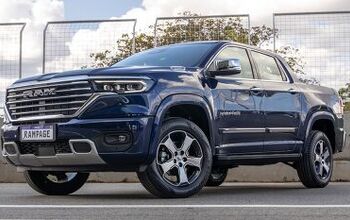IIHS Study Suggests Buyers of Used Vehicles Learn Less About Their Car

The Insurance Institute for Highway Safety (IIHS) is claiming that individuals shopping for a secondhand automobile end up learning less about the modern features lurking within their automobiles. Considering salespeople have meetings about how best to hype the advanced driving aids in new models, this one really shouldn’t have required a survey for the IIHS to piece it together. But the outlet appears to be attempting to link this alleged lack of knowledge to make claims that it’ll somehow contribute to the probably of used vehicles being involved in a crash.
“Used car buyers were substantially less likely than new car buyers to know about the advanced driver assistance features present on their vehicles,” stated IIHS Senior Research Scientist Ian Reagan, the author of the study. “They were also less likely to be able to describe how those features work, and they had less trust in them. That could translate into less frequent use, causing crash reductions from these systems to wane.”
From IIHS:
Previous research has shown that forward collision warning with automated emergency braking (AEB) reduces police-reported front-to-rear crashes by 50 percent. Lane departure warning reduces single-vehicle, sideswipe and head-on crashes by 11 percent, and blind spot warning reduces lane-change crashes by 14 percent. However, the drivers of vehicles equipped with these features don’t always use them.
To explore potential differences in how new and used car buyers view these technologies, IIHS commissioned a survey of more than 750 drivers who owned 2016-19 models equipped with advanced driver assistance features as standard equipment. The respondents included 402 owners who bought their vehicles new and another 362 who bought their vehicles used.
Forward collision warning with AEB alerts the driver of an impending collision with another vehicle and automatically brakes to avoid impact. Lane departure warning notifies the driver when the vehicle is drifting out of the travel lane. Blind spot warning provides an alert when another vehicle is present in the adjacent lane.
The survey asked a series of questions pertaining to crash avoidance features, in addition to adaptive cruise control, to see how much drivers knew about the systems in their cars. The resulting data indicated that 84 percent of new-car buyers understood that their vehicle was equipped with blind-spot warning, compared with only 72 percent of used-car buyers. Meanwhile, 77 percent of ne-car buyers could accurately describe what lane-departure warning does vs 66 percent of those buying secondhand.
IIHS attributed this to those buying new having visited dealerships specializing in the brand they purchased 95 percent of the time (which honestly seems low), whereas the used autos only came from identically branded shops 74 percent of the time.
“Both sets of buyers said they received a good introduction to their vehicle’s features when they purchased it,” said Reagan. “But the buyers of new vehicles were more likely to say that the salesperson discussed details like how to adjust the features’ settings or the situations in which [advanced cruise control] might be useful.”
I’m going to go out on a limb and suggest that the average driver has absolutely no clue how a majority of advanced driving aids work on any vehicle they currently own, regardless of where it came from. The IIHS even reported that only two-thirds of new buyers could present “acceptable” knowledge about what advanced cruise control even did.
But its solution to ensure dealers spend more time informing customers on the myriad of systems located within modern cars feels like a pipe dream. While I’m in total agreement that a person cannot take advantage of a feature they don’t know how to activate, most salespeople are going to prioritize getting their commission rather than spending hours with a customer to go over every single menu option (Ed. note — some dealers pay a person specifically to go over features with buyers as they take delivery). Additionally, there’s been too much fussing over the hidden problems associated with advanced driving aids for me to view them as habitually beneficial to drivers. I rarely have much use for anything that doesn’t offer greater situational awareness.
Though a research institute funded primarily by auto insurance companies is probably going to feel differently. Despite having released numerous studies showing how fallible modern safety tech can be, the IIHS has treated advanced driving aids with far more kindness than we have. Like most organizations, its allegiance remains with whoever is paying the bills and insurers have gotten interested in rolling these systems into tomorrow’s premiums.
That doesn’t make its studies worthless, just some of the resulting takes.
[Image: David Touchtone/Shutterstock]

A staunch consumer advocate tracking industry trends and regulation. Before joining TTAC, Matt spent a decade working for marketing and research firms based in NYC. Clients included several of the world’s largest automakers, global tire brands, and aftermarket part suppliers. Dissatisfied with the corporate world and resentful of having to wear suits everyday, he pivoted to writing about cars. Since then, that man has become an ardent supporter of the right-to-repair movement, been interviewed on the auto industry by national radio broadcasts, driven more rental cars than anyone ever should, participated in amateur rallying events, and received the requisite minimum training as sanctioned by the SCCA. Handy with a wrench, Matt grew up surrounded by Detroit auto workers and managed to get a pizza delivery job before he was legally eligible. He later found himself driving box trucks through Manhattan, guaranteeing future sympathy for actual truckers. He continues to conduct research pertaining to the automotive sector as an independent contractor and has since moved back to his native Michigan, closer to where the cars are born. A contrarian, Matt claims to prefer understeer — stating that front and all-wheel drive vehicles cater best to his driving style.
More by Matt Posky
Latest Car Reviews
Read moreLatest Product Reviews
Read moreRecent Comments
- Scott The previous generation had a lower coefficient of drag, and got better fuel economy.
- Kjhkjlhkjhkljh kljhjkhjklhkjh lol greedy exec versus greedy investor about a company struggling to exist ... lololololololololol ..
- Pig_Iron Fun and fascinating history.
- CanadaCraig I would very seriously consider buying a HYBRID next time. But will not buy an EV.
- Oberkanone At least gm is not moving to New York.

































Comments
Join the conversation
Why don't Toyota and Honda, etc make a decent station wagon any more. A SUV is not a wagon.
My best buddy bought a year-old M4 back in 2016. A few weeks ago I'm out visiting him and it's pretty cold outside. I ask him how he likes the heated steering wheel in his car - he looks over with a blank stare before saying "I don't have a heated steering wheel". "Uh, yes you do. Reach around the steering column on the left side..." a moment later when he feels the switch, he lights up. "Son of a ...!" He had no idea it was there. So it's not just important safety features 2nd buyers are missing, it's simple (but useful) stuff like this too.